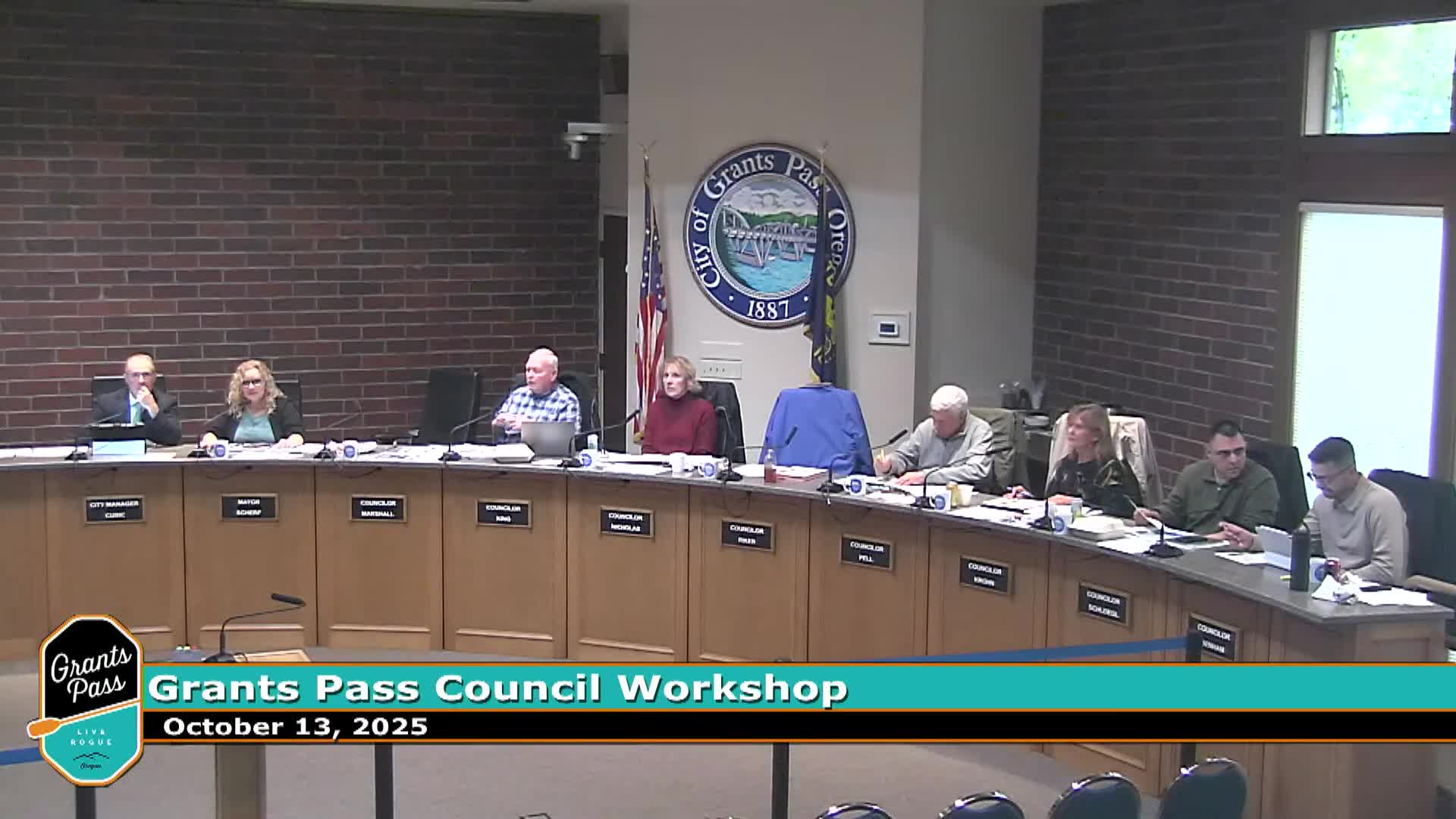Grants Pass council backs immediate pay‑equity fixes, approves retroactive 3.02% COLA for eight nonbargaining positions
Get AI-powered insights, summaries, and transcripts
Subscribe
Summary
After a presentation on market and internal pay equity, the Grants Pass City Council voted to address immediate pay‑equity gaps for eight nonbargaining positions and apply a retroactive 3.02% cost‑of‑living adjustment while directing staff to continue work on broader compensation changes.
Grants Pass City Council voted on Oct. 15 to address immediate pay‑equity gaps for eight nonbargaining positions and apply a retroactive 3.02% cost‑of‑living adjustment, after hearing staff and task‑force recommendations to overhaul the city’s nonbargaining pay schedule.
The council’s decision follows a presentation by Stephanie Nuttall, city staff, who said the task force recommends a market‑based reclassification and a new placement methodology, with an effective date of July 1, 2025. Nuttall told the council the package is intended to balance fiscal sustainability with the need to recruit and retain staff and to comply with Oregon pay equity law.
The vote funds and authorizes one near‑term step in a larger review. Councilor Seth moved the proposal to address the immediate pay‑equity issues for the identified positions, add a retroactive COLA of 3.02% (the 2024 CPI‑U), and continue work on the full compensation project; the motion passed on a 5–2 roll call. The council directed staff to place the action on the next council agenda for formal adoption.
Why it matters: city staff said the recommended changes adjust pay bands and placement rules so market average aligns with step 6 of the schedule and creates a consistent step progression (4% between steps up to step 6, 2% after). Officials said the changes aim to reduce repeated, ad hoc corrections later and to meet Oregon’s pay‑equity requirements.
Key elements presented by staff included: - Effective date: July 1, 2025 (task force recommendation). - Reclassifications: reclassify five positions identified in the task force review (GIS coordinator to GIS supervisor, water distribution supervisor, plus reclassifications for utility billing manager, information technology director, and chief financial officer); earlier budget actions added two of these reclassifications during the budget process. - Vacation accruals: increase maximum accrual from 200 to 370 hours and revise executive accrual rates from 4.62 to 5.54 hours per biweekly pay period (0–35 months) and from 6.16 to 7.39 hours per pay period (>36 months). - Holiday compensation: align police executive/managerial and exempt classifications to 11 holidays plus 2 personal holidays annually (to match confidential classification). - Longevity incentive: a flat 1% of base pay after 10 years of city service and 2% after 15 years (not additive). - Salary schedule and placement: place market average at step 6; apply 4% step differentials up to step 6 and 2% thereafter; the 2024 CPI‑U (3.02%) would be added to the salary schedule pre‑placement (the COLA would not be applied uniformly to each employee but to the schedule before placing employees onto it). Placement methodology recommended counting 3 years of substantially similar prior experience as one step; staff noted the State of Oregon uses a 2‑years‑per‑step convention.
Cost and budget: staff reported the current recommendation was estimated at approximately $1.10 million overall (the presentation gave a figure reported as $1,100,000.024914). Staff said about $286,000 of that amount would come from the general fund; that total was lower than a prior May proposal that had been factored into the FY 2025–26 budget. Staff also said the package as presented was already reflected in the draft FY25–26 budget projections (the May proposal had been roughly $250,000 higher than the current recommendation).
Council discussion focused on fiscal sustainability, recruitment and retention, and the city manager’s inclusion in the nonbargaining schedule. Several councilors urged a phased approach or limiting immediate increases to positions with clear pay‑equity gaps. One question raised repeatedly was whether the city manager should remain on the municipal salary schedule because the manager’s contract contains benefits not received by other nonbargaining employees; staff replied that the city previously placed the manager on the salary schedule by council resolution, and any change would require council action.
Task force and consultant: Councilors and task‑force members said the consultant’s market analysis (presented to the task force) supported reclassification and schedule changes. Tom, a task‑force member, said the group recommended the package as presented but noted the council could choose alternatives.
Next steps: council directed staff to prepare the formal agenda item for the next council meeting (Wednesday), including nonconfidential summary numbers for the affected positions, and to continue work on longer‑term compensation policy options. Staff cautioned that individual personnel details are confidential and cannot be published in open session; staff said they would provide appropriate summary materials to council in advance of the next meeting.
Ending: With the motion passing 5–2, the council approved addressing immediate pay‑equity issues and applying the retroactive 3.02% COLA for the identified positions and left broader implementation details (vacation caps, longevity policy, and placement methodology) to further council direction and future action.
